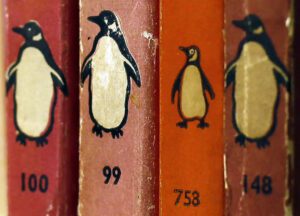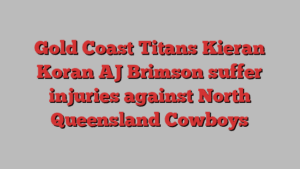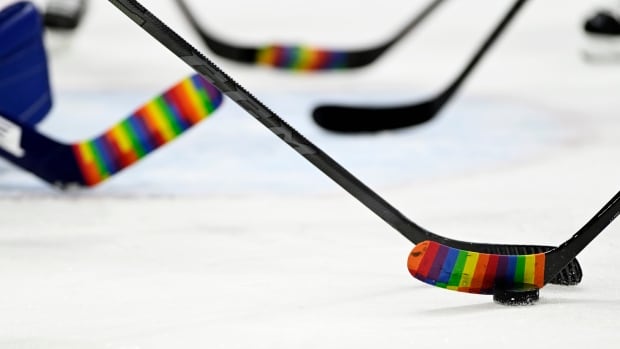
Growing up in Edmonton, Daylen Mitansky didn’t feel like the hockey rink was a place that would welcome him.
“Don’t say gay was a huge thing,” he said. “Jocks were never [openly] gay, you know. It was just unheard of.”
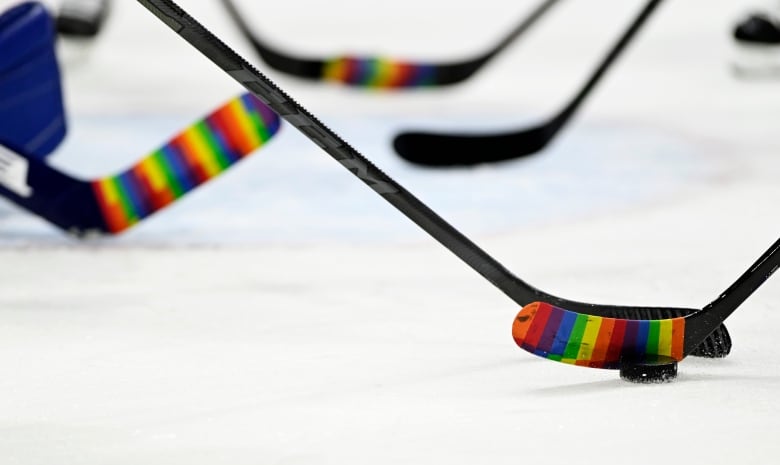
He eventually found his way onto the ice in 2017 at 29, playing with an LGBTQ hockey team in Calgary. He’s now on the board of the Calgary Inclusive Hockey Association, which includes two teams — the Pioneers and the Villagers.
Mitansky marvels at how far hockey has come since he was a kid, and at seeing the NHL make strides toward inclusion. But now he’s watching with a bit of concern that the league is taking a step backward.
The NHL and some of its teams are facing fallout over players who don’t want to take part in Pride Night — a show of support for LGBTQ fans and athletes.
There are concerns the league’s handling of the situation could set back years of progress on LGBTQ inclusivity — though some would say the sport has not progressed far enough — and the timing couldn’t be worse. Not only is hockey facing a reckoning over toxic culture in the sport, including sexual misconduct and various forms of discrimination, but this situation coincides with LGBTQ people facing a new surge of hate and, in parts of the U.S. at least, a rollback in long-fought for rights.
NHL’s Pride Night problem
Pride Nights have become an annual affair for the NHL, with all 31 teams hosting their own versions of the event in 2018. Although there are a several components, the highlight is often seeing players on the ice for warm ups with rainbow logos on their jerseys or rainbow tape wrapped around their sticks.
But this year, some players have said wearing any sort of symbol supporting LGBTQ people goes against their religious beliefs. Meanwhile, three teams — the Minnesota Wild, the New York Rangers and Chicago’s NHL team — cancelled their Pride Night warm ups, though kept other events.
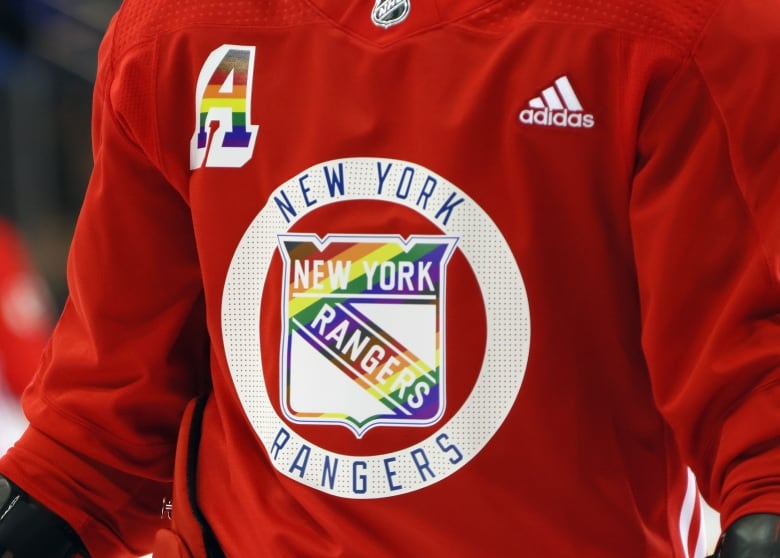
In Chicago, the reason given for the cancellation was that three of the team’s Russian players could face repercussions in their home country because of restrictive laws against the promotion of what it calls “non-traditional sexual relations.” The Russian government imposed a stricter version of this law last year, though a form of it has been around since 2013.
Even if the players were penalized, it would likely result in a fine — one they could no doubt afford. Some reports have suggested there are concerns the players’ family members in Russia could also face backlash.
NHL deputy commissioner Bill Daly told The Athletic the league had “no information that would suggest there is any material threat that would exist [in Russia or otherwise] related to a Russian player participating in a club’s Pride activities.”
Previously, NHL commissioner Gary Bettman said the league and its clubs “had to respect some individual choice” and that respecting diversity sometimes means understanding differences.
Up To Speed7:00Investigative sports reporter reacts to player refusing to wear pride jersey.
An NHL player boycotts his team’s Pride night by refusing to wear a special jersey – what does this say about the state of hockey culture? Laura Robinson, an investigative sports reporter reacts.
Show of support or just a show?
Kristi Allain, a sociology professor at Fredericton’s St. Thomas University, who researches hockey culture, said it seems like the NHL was trying to present itself as a “beacon of diversity [and] inclusion” while also allowing some of its stars to get away with prejudice.
The reasons given — from players’ religious beliefs to their perceived risk of running afoul of Russian laws — just don’t cut it for her.
If showing support for LGBTQ fans and players is part of the values and standards of the league or a particular team, she says players should be expected to abide by those standards.
“Teams impose all kinds of rules on players,” she told CBC News. “Athlete codes of conduct actually far outstrip what we would be expected to abide by in all kinds of other jobs.”
Put another way, the players should know what they’re signing up for when they ink multimillion-dollar deals. And if a team is “truly committed to diversity,” Allain questions why they are hiring players who hold discriminatory views.
She says the league could hold players accountable and even impose penalties like they do in other situations — though that raises the question about how genuine a show of support for the LGBTQ community is.
Allain said she’s skeptical about how much the league is actually committed to diversity and inclusion versus how much it’s trying to keep up appearances for the sake of marketing.

“It’s about teams that actually have a true commitment to inclusion, not just to selling an identity of inclusion,” she said.
“It’s about having teams and athletes who understand misogyny, understand homophobia, who understand discrimination and understand it deeply.”
Work in progress
The organization You Can Play has been working with the NHL for more than a decade to improve the representation and inclusion of LGBTQ people in hockey and collaborating with teams to hold Pride Night events — which also include education, outreach, performances and support for local LGBTQ businesses and organizations.
David Palumbo, the chair of You Can Play’s board, isn’t cutting the league any slack for its handling of the situation, but he doesn’t want to take away from the progress he’s seen — including the fact that most players do participate in Pride Night events.
Many players have spoken out to say they want to foster a culture of inclusion in the sport.
In a social media video by the club, Florida Panthers forward Matthew Tkachuk said, “everyone is welcome” at Panthers games and in the locker-room. That was on the same day Canadian brothers Eric and Marc Staal refused to wear the team’s Pride jerseys, citing their religion.
“Everybody’s welcome in my locker room.” ❤️ <a href=”https://t.co/YwPvqdJYYQ”>pic.twitter.com/YwPvqdJYYQ</a>
—@FlaPanthers
Last week, on the same day the San Jose Sharks’ Manitoba-born goaltender James Reimer declined to wear a jersey during the team’s Pride Night warm up, the team posted a string of tweets about LGBTQ rights and discrimination.
One of the tweets said that 73 per cent of respondents to a survey about homophobia in sport “believe youth team sport is not safe for gay people.”
73% of respondents believe youth team sport is not safe for gay people. Also, 81% of gay men and 74% of lesbians are completely or partially “in the closet” while playing youth sports. Many fear discrimination from players and officials.
—@SanJoseSharks
Palumbo admits LGBTQ inclusion in hockey may still have a ways to go, but he believes taking part in an expression of support meant to be more welcoming isn’t an affront to someone’s faith.
“Putting [a Pride jersey] on is not signing up for anything else or getting you to waive your beliefs or anything, but you are part of an organization that is making a very visible statement of support to a community that has been marginalized and has felt the effects, specifically in sports,” he said.
Mainstreet NS8:40Alex Shprintsen talks Russian NHL athletes refusal to wear pride theme jerseys
Are Russian hockey player’s in the NHL actually putting their families at risk back in Russia by wearing pride themed jerseys? CBC documentary television producer Alex Shprintsen breaks this down in a conversation with host Jeff Douglas.
A step forward, a step backward
Mitansky says he’s seen firsthand that the NHL has put its money where its mouth is.
In 2021, the Calgary Inclusive Hockey Association was one of the recipients of a combined $100,000 donation the league made to LGBTQ organizations.
The donation was made in honour of Nashville Predators prospect Luke Prokop who came out in 2021 and is the only openly gay player under NHL contract.
<a href=”https://t.co/kCYnEbcqqR”>pic.twitter.com/kCYnEbcqqR</a>
—@lukeprokop_6
In an Instagram post, Edmonton-born Prokop expressed disappointment in teams that scrapped plans for players to wear Pride jerseys and in individual players who refused to wear them.
“Pride nights are an important step toward fostering greater acceptance and understanding in hockey,” he said.
Mitansky said although there may only be a few instances of teams or players opting not to wear Pride jerseys, he’s concerned it could be a slippery slope considering a deteriorating climate toward LGBTQ people in parts of the U.S.
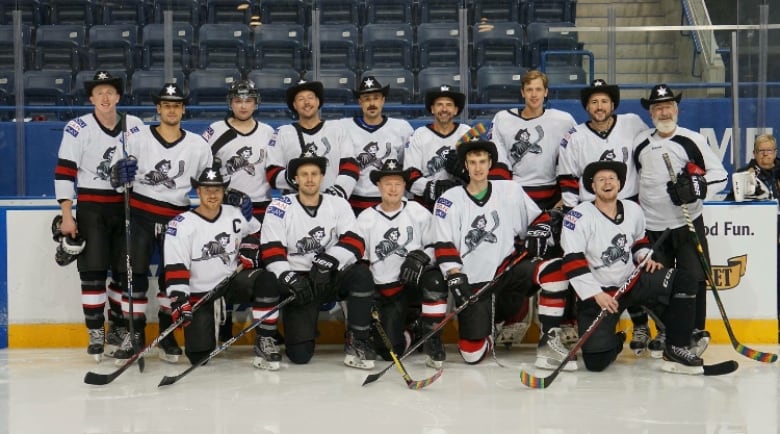
For now, he’s watching to see what will happen with three upcoming Pride Nights in western Canada — the Edmonton Oilers on Saturday night, the Calgary Flames on Tuesday night and the Vancouver Canucks on Friday — and what the sport as a whole does next.
His message to the league: “Please don’t turn your back on us.”
